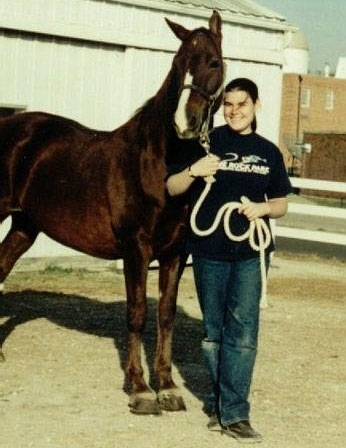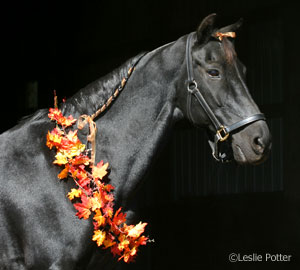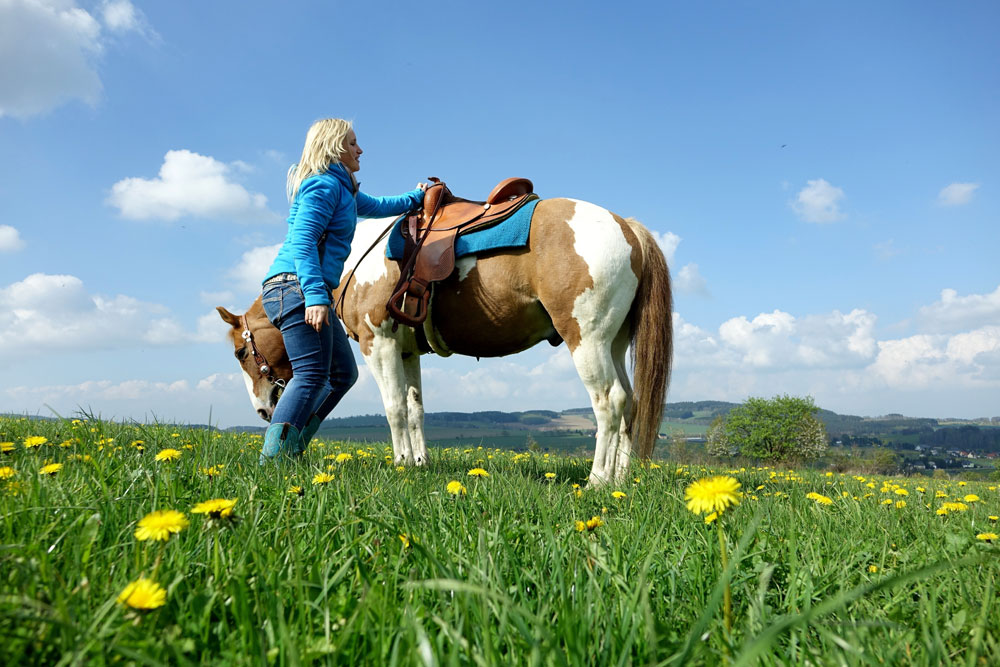 Here’s me as an 18-year-old college freshman with my friend Stormy. I showed a lot of promise as a trainer by teaching this horse to give kisses in exchange for apples. It was the pinnacle of my equestrian career. |
Note: This is day 19 of my 30-day blogging challenge. What the heck is a 30-day blogging challenge? Read about it here.
Follow your passion and “never work a day in your life,” or do something practical (and preferably lucrative) in your day job so that you can afford your passion as a hobby. In the former, you risk burning out on your passion. In the latter, you risk draining your energy at a day job that isn’t meaningful to you.
The practical career vs. following your passion debate rages on in the horse world, and there is no easy answer.
In hindsight, my teenage decision to major in equestrian science with the aim of being a show horse trainer seems misguided. But I don’t regret it, and it certainly worked out for some of my peers, so it’s not a worthless path. Still, if I were to go back to my 17-year-old self to advise me on what to do, I honestly am not sure what I would tell me. And it doesn’t matter, because I’m sure I wouldn’t listen to me anyway. Teenagers.
Nevertheless, here are some things I know about being an adult person with a job that I would tell 17-year-old aspiring adults:
- Not everyone is cut out to be a professional horse trainer, rider or instructor, but that doesn’t mean they can’t be a happy and successful amateur competitor or recreational rider. And I would argue that stepping over to the amateur side is not a backwards step, but a lateral one. Deciding you no longer want to pursue a career as an equestrian professional means you’ve learned something about yourself, and that’s progress. (Related: Why do you ride?)
- You’re probably going to get burned out, regardless of whether you work in a barn or in a cubicle. I never got tired of the day-to-day care of horses and there were always some lessons I enjoyed teaching. But by the end of a long summer of camp, I sometimes wished the arena footing would turn to quicksand beneath me and swallow me up before the next group of six-year-old beginners showed up. I guess if I could make a viable living doting on a herd of lesson horses and teaching only select lessons, maybe I could have career satisfaction indefinitely. But in the real world, every job is going to have parts that start to get to you after a while. It’s never perfect.
- In between the time I worked in a barn and when I landed at Horse Illustrated, I had a few boring but inoffensive Office-Space-type cube farm jobs. I encountered people in those places who absolutely thrived. They were always cheerful and never seemed to have a bad day, even if the work we were doing was dull. I’ve since learned that these people belong to a strange subcategory of humans known as extroverts, and they thrive in the stifling doorless environment favored by modern office layouts in which you cannot get away from humanity for a single second to be alone with your thoughts. As it turns out, those people would wither away in the fortress-of-solitude environment where introverts like me do our best work. Had they been horse people, they probably would have enjoyed the teaching of the group lessons that wore me out and really disliked the quiet hours of solitary barn chores that I loved. It takes all kinds, and it’s helpful to know what kind you are.
- If you make your passion your career, you should probably still have other hobbies. One advantage of working at a non-horse job is that you can leave the office after a bad day and go spend time with your horse to unwind. That doesn’t work as well if you have a stressful day at your barn job. My suggestion to all aspiring adults is to proactively select some healthy backup hobbies like basketball or painting. Otherwise, it’ll get to the point that you just need to blow off steam and you end up with less-healthy hobbies like binge drinking and/or drag racing. True fact.
- If you’re going to go the route of getting a high-paying job to afford your horse habit, please understand what this entails. Believe it or not, not all non-horse jobs are high-paying jobs. If making money is in your life plan, be sure to do some research before embarking on a career path. We live in a world that values hard science, math and technology-based careers. If you are good at these things and enjoy them, then carry on. If you think you’re not good at these things, you’re probably being too hard on yourself and you should take a closer look at some of those careers. I bet there’s something there for you. If you’re really sure, then I don’t know what to tell you. Maybe law school? I don’t know. Just don’t go thinking you can major in creative writing and still comfortably afford a horse.
- No, there’s nothing wrong with creative writing. Frankly, your engineering friends will be in grad school, then paying off student loans for a long time after you’ve graduated and started your adult life. And just because you can’t comfortably afford a horse doesn’t mean you can’t uncomfortably afford one, though I don’t recommend it. There are also other options, like riding school horses, half-leasing or catch riding. Or after a year of working at Starbucks and living in your childhood bedroom, you might find a job at a barn that includes housing and decide that’s a life upgrade for you. Look at that. You’re an equine professional after all.
- You’re probably going to change jobs something like 11 times in the first 30 years of your working life. So basically, don’t sweat it. Just because you choose to follow one career path when you’re 17 doesn’t mean you are committed to it for life; statistically, there ain’t no way that’s gonna happen.
So there it is. My unqualified career advice brain dump for equestrian-inclined young people. By this point, 17-year-old me would be bored and confused and would have stopped listening to me in order to go watch The X-Files. I don’t blame me.
Back to The Near Side
Leslie Potter is Sr. Associate Web Editor of horseillustrated.com. Follow her on Twitter: @LeslieInLex.





good article for those of us who have yet to get a job.. I’d someday like to get intopossibly equine photography, but that;’dprobably just be a hobby…
I would love to work professionally in the horse industry, but I’m sick of all the people who act like you know nothing if you didn’t learn to ride at age 2.